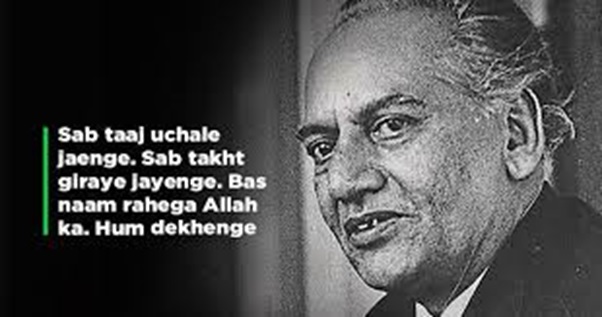
The Silly Controversy around Faiz' Poem Hum Dekhenge
By Justice Markandey Katju
Former Judge
Supreme Court of India
Mumbai, India

There’s nothing anti-Hindu in it
Faiz’s poem Hum Dekhenge that attacks oppression was written in the time of martial law in Pakistan. IIT-Kanpur’s administration has made itself a laughing stock by not understanding this.
The Indian Institute of Technology (IIT), Kanpur, one of the premier technical institutes in India, set up a panel to consider whether the poem Hum Dekhenge by the famous Pakistani Urdu poet Faiz Ahmed Faiz was anti-Hindu.
This followed the recitation of the poem by students of IIT-Kanpur on December 17, 2019, on their campus during a gathering in support of the students of Jamia Millia Islamia in Delhi, who were assaulted by the police during their anti- Citizenship Amendment Act (CAA) agitation. One need not go into the inanity of such a step by the IIT authorities who seem to have no understanding of Urdu poetry or this particular poem.
I have read the poetry of many countries, and also of many languages in India. In my opinion, no poetry in the world, whether in English, German, French, Russian, Spanish, Hindi, Sanskrit, Bangla, Tamil, etc. expresses the voice of the human heart in such a powerful and yet elegant manner (andaaz-e-bayaan) as Urdu poetry does.
Mirza Ghalib is regarded by many as the greatest Urdu poet of all time and Faiz the greatest Urdu poet of the 20th century. I had the privilege of meeting Faiz once when he visited my hometown Allahabad in 1981 and was honored at a massive function on the Allahabad University’s lawns.
Urdu poets often express their thoughts not in direct language but indirectly, through hints and allusions. Urdu shers (couplets) often have a literal, superficial, outer meaning but they also have a deeper, inner, real meaning which is conveyed by hints, allusions, indications, suggestions, and metaphors. It is this deeper, real meaning which the poet is really seeking to convey. But to understand it, one has to ponder deeply and apply one’s brains to understand what the poet is trying to say. This use of indirect language is particularly done by poets in times when it may be dangerous to write directly, such as in Czarist Russia (when Maxim Gorky wrote his allegorical poem 'The Song of the Stormy Petrel', which was a powerful attack on Czarist rule), or during martial law in Pakistan when Faiz Ahmed Faiz wrote his poem Hum Dekhenge.
Take for instance Faiz’ sher:
“Gulon mein rang bhare baad-e-naubahaar chale
Chale bhi ao ki gulshan ka kaarobaar chale.”
Now the literal meaning of this couplet is:
“Among the colorful flowers, the new spring breeze is blowing.
Come, so that the work of the garden can be done.”
But that is only the superficial meaning of the couplet. The word “gulshan” literally means garden, but here it means the nation. So, the real meaning of the sher which the poet is conveying is this:
“The objective conditions in the country are ripe. Come forward patriots, the country needs you (for a revolution).”
Thus understood, the poem is not a love song at all, as many people think, but a call for a revolution.
Similarly, when we read Urdu poetry we must wrack our brains and try to understand what it is really that the post is seeking to convey.
Coming now to Faiz’s poem Hum Dekhenge one must remember it was written during General Zia-ul-Haq’s oppressive martial law regime when it was dangerous to talk directly. So, part of the poem uses traditional Islamic imagery. However, it is used to attack Zia’s dictatorship and restore democracy, not for establishing orthodox Islam. The poem was sung by Iqbal Bano, deliberately wearing a sari (regarded by some as an Indian and unislamic attire for Pakistani women), despite the ban on public recitation of Faiz’s poems at that time. In fact, Iqbal Bano was later banned from singing anywhere in Pakistan. Many from the audience were rounded up, grilled, and detained.
Some of the lines of the poem which are described as anti-Hindu are:
“Jab arz-e-khuda ke kaabe se sab but uthwaaye jaayenge.
Hum ahl-e-safa mardood-e-haram masnad par baithaye jaayenge.”
The literal meaning of this couplet is,
“When from the abode of God (Kaaba) all icons will be removed.
Then, we the faithful, who were debarred from sacred places, will be placed on the royal throne.”
It is alleged that these lines are anti-Hindu as Hindus worship idols, and these lines are clearly against idol worship.
But this is only a superficial understanding of the verses. What it means is that self-styled icons of power will be thrown out and God’s beloved or common people will rule.
Faiz was a life-long communist and he could hardly have meant that he wanted Islamization of society. In fact, it was his antagonist General Zia who wanted Islamization. To understand these lines, we must see the context and also see the couplets preceding and succeeding them.
Before these lines, the verses in the poem are:
“Jab zulm-e-sitam ke koh-e-giraan, rui ke tarah udh jaayenge.
Hum mehkoomon ke paaon tale, yeh dharti dhad dhad dhadkegi.
i.e.
When these high mountains of tyranny and oppression turn to fluff and evaporate.
And we oppressed, beneath our feet will have this earth shiver and shake repeatedly "
The succeeding lines are
"Sab taaj uchaale jaayenge,
sab takht giraaye jaayenge.
i.e.
"When crowns will be thrown off
and overturned will be thrones.”
It is obvious from this that there is nothing anti-Hindu in this poem and it is the height of absurdity to regard it so. It is a poem powerfully attacking the oppressors of the people and expressing the conviction that one day the oppressed will become the rulers of their own destiny.
The administration of IIT, Kanpur, which is otherwise a reputed institution, made itself a laughingstock before the whole country by setting up a panel to review if the poem is anti-Hindu or not.
(Markandey Katju is an Indian jurist and former judge of the Supreme Court of India who served as chairman of the Press Council of India from 2011 to 2014)

